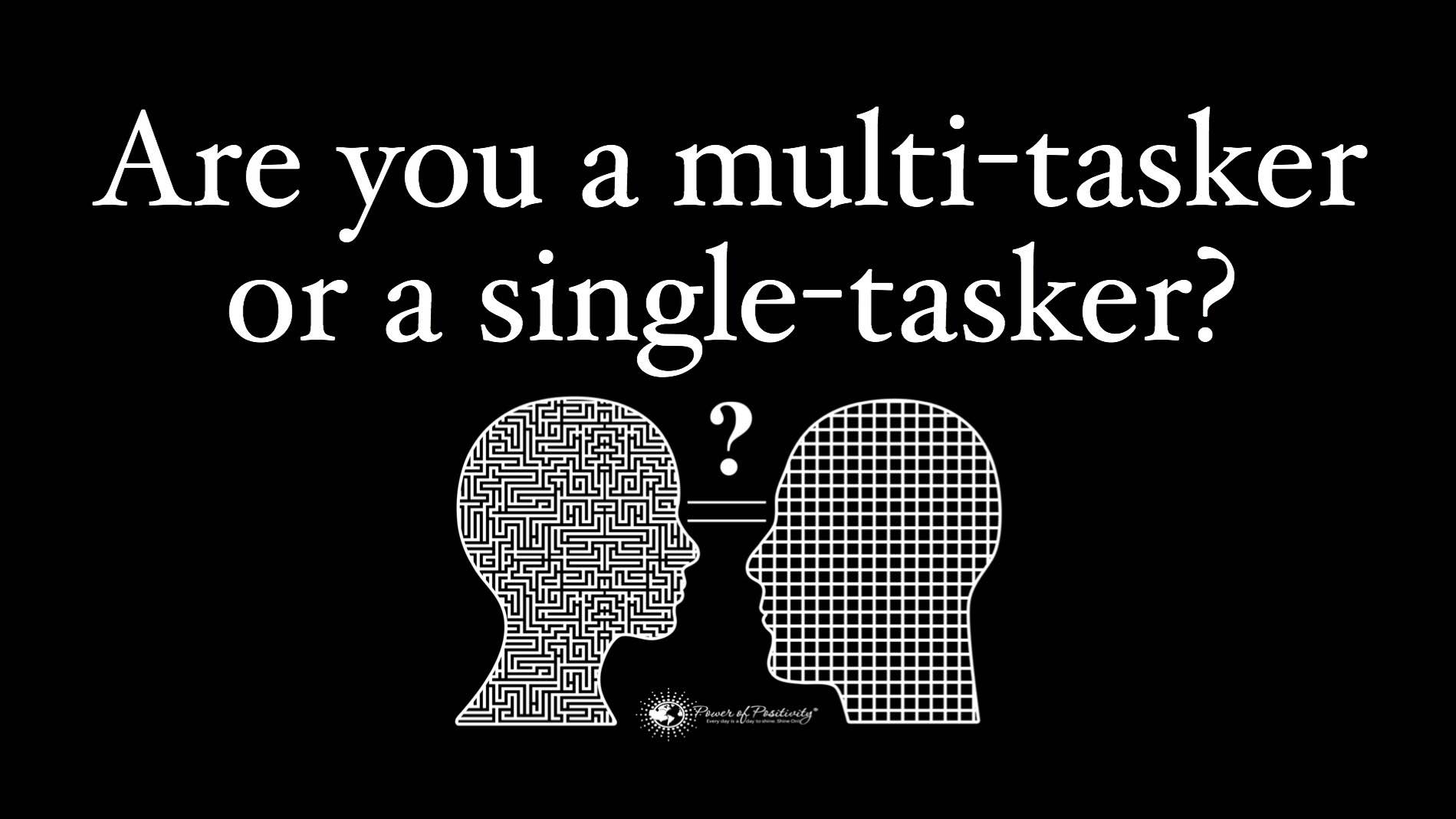In a society that places an incredible amount of emphasis on multitasking, it can be difficult to justify to ourselves the benefit of doing one thing at a time. First off, many traditional working environments don’t provide the structure to single-task. Business offices, now more than ever, utilize computers and networks that implement instant messaging, email, and other “productivity” tools. Since we spend a disproportionate amount of time at the office, it is easy to allow these habits to sink in.
“The quickest way to do many things is to do one thing at a time.” – Christopher Westra
Multitasking actually encompasses three different types:
- Performing two or more tasks simultaneously.
- Switching back and forth from one task to another.
- Performing a number of tasks in rapid succession.
While these behaviors may appear completely fine, multitasking is actually a disadvantage. To be clear, it is possible to multi-project, that is, to work on multiple projects. As long as we’re consciously approaching each project in a “task-by-task” manner, we can still be very productive. However, many of us are still quite inept at working on one thing at a time.
Some of us may not quite be convinced that single-tasking is better, and that’s okay. We’re going to break down why single-tasking is a better approach to both our work and our personal lives. Yes, we can implement the tenets of single-tasking effectively into our personal lives – with family, prayer/spirituality, reading, meditation, and a host of other activities.
So, why is single-tasking better than multitasking? Here are 10 reasons:
1. Single-tasking conserves energy
Our brains consume more energy than any other part of our body. When we single-task, we wholly direct our attention to the task. Multitasking is more taxing on the brain’s energy reserves because we constantly shift attention. Our short-term memory also benefits because we’re not continuously attempting to remember where we left off, and on what task. This added benefit also helps to keep our energy levels up.
2. Single-tasking improves productivity
Simply put, the human brain is not designed to multitask. Studies have consistently shown the performance benefits of directing our attention spotlight onto one thing and one thing only. When researchers from Harvard, Stanford and the University of London were polled, they all stated that productivity can be reduced by as much as 40 percent.
3. Single-tasking increases commitment
When we single-task, we are laser-focused on what’s in front of us and nothing else. What does this enhanced focus do? For one, it establishes specific patterns of behavior in the brain. A sense of commitment is forged, as single-tasking obliges us to perform one task at a time. To single-task requires us to stand firm in our choices and commit to executing excellently.
4. Single-tasking promotes self-discipline
Building upon the commitment benefits of single-tasking, self-discipline is manifested through conscious, committed effort. Distractions, no matter how pleasant they may seem at the time, cause us to “give in” to them. When we “give in,” we effectively hand over our self-control. It’s quite simple, really. One builds self-control through single-tasking, and self-control is the sibling of self-discipline.
5. Single-tasking strengthens us against distractions
If we pay attention, it is quite easy to spot people being distracted. No matter if it’s the adult driver who texts on the highway, or the co-worker constantly heading to the break room. There’s no getting around the fact that people are slaves to distracting thoughts. When we practice single-tasking, we’re no longer subject to this behavior. We’ve build an impenetrable wall that refuses to give in to internal or external interruptions.
6. Single-tasking improves our attention span better than multitasking
This should go without saying, but single-tasking is the aphrodisiac to attention. Yes, it is a requirement to single-task for a certain period of time before we obtain noticeable improvements to attention, but it’s better than the alternative. Consider this: according to the National Center for Biotechnology Information at the U.S. National Library of Medicine, the average attention of a human is eight seconds. Eight seconds. We can change that statistic.
7. Single-tasking makes us happier
The problem with today’s culture is that society expects us to be busy all the time. Look at people on the highway – they’re cutting each other on their commute into work. What does that tell us? In all seriousness, we can apply single-tasking of our lives and can become happier. We’ll get maximum enjoyment out of time with family, with that coveted book, or in our own self-reflection if we’re willing to devote ourselves to the practice of single-tasking.
8. Single-tasking improves our communication
How many of us are guilty of mentally disappearing mid-conversation *raises hand*? Yeah, this is a near-universal trait. However, when we practice single-tasking, we not only give our full attention to another person (an admirable and respectable trait), we also are more in-tune with our thoughts. The end result is an individual who is thoughtful, respectful, and present – all necessary components for one to be an effective communicator.
9. Single-tasking improves our relationships
Really, what is more important than our personal and professional relationships? Not much at all. Here’s a brutal truth. At one time or another, one or more relationships see negative impacts from multitasking. Picture the parent rushing home and brushing off their children because of work or something else, or the salesman who neglects to call an important customer. Get the idea? It happened in the past. But you can prevent it with a commitment to single-tasking. Not only that but imagine the fruitfulness and enjoyment of our relationships if we commit.
10. Single-tasking gives us an advantage
Finally, single-tasking is a huge advantage – professionally, personally, spiritually, and in other domains. Single-tasking is one of those remarkable skills that can positively impact nearly every part of our daily lives. Indeed, we would all be remiss if we didn’t ask ourselves: “What can single-tasking do for me?”















 Community
Community

